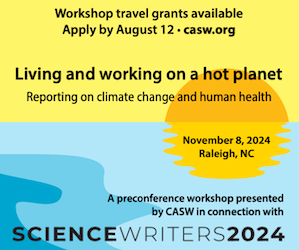SEJournal Online is the digital news magazine of the Society of Environmental Journalists. Learn more about SEJournal Online, including submission, subscription and advertising information.
The WatchDog Alert (formerly WatchDog TipSheet from 2008-2019) was a regular source of story ideas, articles, updates, events and other information with a focus on freedom-of-information issues of concern to environmental journalists in both the United States and Canada.
WatchDog was compiled, edited and written by Joseph A. Davis, who directs the WatchDog Project, an activity of SEJ's Freedom of Information Task Force that reports on secrecy trends and supports reporters' efforts to make better use of FOIA.



















 Advertisement
Advertisement 




